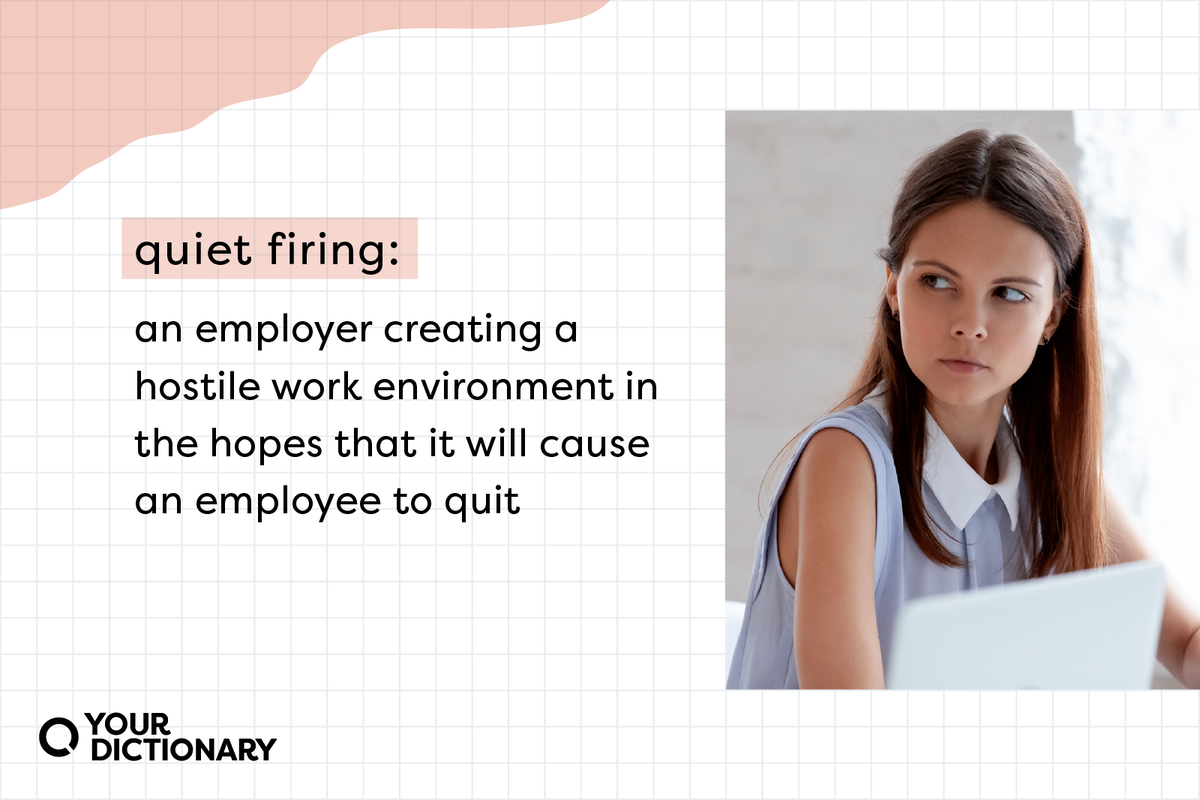
No one enjoys getting fired. It can be a jarring experience that’s unpleasant for all parties involved, so it makes sense that you might want to keep it quiet. But what exactly is quiet firing?
The Meaning of “Quiet Firing”
Much like quiet quitting, quiet firing is a bit of a misleading phrase. Your employer could be quiet firing while yelling and stomping their feet, and quiet firing doesn’t actually involve firing you.
Quiet firing involves an employer creating a hostile work environment in the hopes that it will cause an employee to quit (like, actually quit, not quiet quit). There are a lot of ways that employers could achieve this, but the main idea is providing employees with the absolute bare minimum and hoping those workers get the hint: They’re not wanted and should quit.
If that sounds toxic and dispiriting, you’re right!
Where Did “Quiet Firing” Come From?
The phrase quiet firing came as a direct response to quiet quitting. The exact origin is hard to pinpoint.
- One of the first mentions of it was a Twitter post by user Randy Miller on August 16, 2022.
- The phrase gained even more popularity in a now viral LinkedIn post from Bonnie Dilber, a recruiter at a software company.
- In terms of search, quiet firing reached its peak on September 3, 2022.
"Quiet Firing:" Another Phrase for "Constructive Dismissal"
While the phrase might have entered the public vocabulary only recently, the concept isn’t new by any means. Quiet firing is essentially another way to say constructive dismissal. This is much more common in Canadian and U.K. labor laws.
In the U.S., constructive dismissal usually refers to any sort of involuntary resignation. Quiet firing gets closer to wrongful constructive discharge (which sounds gross, we know).
How To Use “Quiet Firing”
Quiet firing is generally used as a verb or a verb that acts as a noun (known as a gerund around these parts).
- I had a feeling that my boss was actually quiet firing me, but it was hard to tell for sure.
- The quiet firing movement made us all extremely edgy in the office.
- “It’s not an unusual tactic, as more than 80 percent of respondents say they have either seen or experienced quiet firing, according to a recent LinkedIn News poll.” - The Hill
Can I Say “Quietly Firing”?
In general, quiet firing is treated as its own phrase, meaning that you wouldn’t normally turn quiet into its adverb form to modify firing. That helps to set it apart from an employer actually quietly firing you, whispering at you to empty your desk.
However, that’s not a rule set in stone, and quiet firing is still a fairly new term. That means you’ll occasionally see outlets use some form of quietly firing.
- “Quietly firing someone is a way to save on severance or avoid a lengthy performance improvement process.” - Lifehacker
- “So I do think exhausting all the methods you can if you think you are being quietly fired is so important.” - Time
Examples of Quiet Firing
Quiet firing can come in all shapes and forms depending on the workplace, the industry, and the upper limits of your boss’ cruelty. That also means that it can be increasingly hard to spot, but quiet firing can look like:
- You constantly getting passed over for raises and promotions despite working with the company for years
- Your boss never acknowledging your successes and/or fully taking credit for them
- A worker getting a demotion and change of title without any actual changes to their duties and responsibilities
- A programmer getting overloaded with all the worst projects, while their preferred projects get assigned to someone else
- You performing incredibly throughout the year but receiving poor performance reviews without any legitimate rationale
- A teacher asking about potential career growth opportunities and getting shutdown or completely ignored
Is Quiet Firing Good or Bad?
It’s bad. Where quiet quitting is largely about setting boundaries between worker and work to prevent burnout, quiet firing is playing at someone’s basic livelihood. At best, quiet firing involves creating a toxic, negative working environment; at worst, it’s downright abusive.
There’s really no good reason to give into quiet firing if you’re a boss or C-level exec. Aside from being a waste of your time and energy, you’re creating a workplace that is intentionally demoralizing (Surprise! That’s not helpful for anyone!).
Is Quiet Firing Legal?
Technically and unfortunately, quiet firing isn’t illegal. We know, that sounds ridiculous given that it’s basically workplace bullying and mental abuse, but as long as they are staying within the boundaries of general law, your contract, and the rules of the organization, your boss technically isn’t doing anything illegal. That gets even stickier considering your boss is the one making the rules.
Making a constructive dismissal claim typically falls entirely on an employee’s ability to prove that the employer was intentionally trying to force a resignation by creating intolerable work conditions.